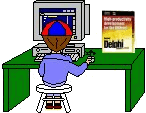What's New - June, 2005
[Home]
June 13, 2005: We're packing for a family trip to Germany and Switzerland so DFF will have a hiatus until July. It sounds like Europe has had a cold, wet spring, so we may come back knowing more about Germanic art, culture, and history than originally planned. But, with enough good food and beer, sunny mountaintops will just be a bonus, not a requirement for an enjoyable trip!
June 9, 2004: One more Beginner's program from a recent Mensa Puzzle-a-Day calendar. I called it Expressions864: Find all solutions where the sum of two numbers equals 864. And by the way, the solution, including the "864" sum must contain all of the digits 1 through 9 exactly once. Only about 35 lines of code to solve this one, including a test to eliminate duplicate solutions.
I did also coded the problem in our Brute Force program and uncovered a small bug there. In a feeble attempt to eliminate duplicate solutions, I was eliminating any that had a repeated variable value. But, of course, reusing a single variable value does not mean that the solution is a duplicate. I have simply removed the uniqueness test for now.
June 8, 2005: Here are two more simple little programs that I added to the Beginners Techniques page in Delphi Techniques. They do not do much but may illustrate some new techniques for the beginner's repertoire. DrawDice draws a random pair of dice with each button click. CountWords lets you load a text file and get a count and list of the words it contains or a summary of number of occurrences by word.
June 6, 2005: Some one posed the Four Dice Puzzle to me the other day. The problem is to find a set of 4 special six-sided dice which may have more than 6 dots on a side and may repeat the number of dots on a side. The set, if labeled A B C D, has the property that when rolled in pairs, on average, A beats B, B beats C, C beats D and D beats A! Makes a good non-fair game if you let your opponent choose his die first. This version lets you set a number of parameters to look for other solution sets and to print the solutions as a deck of playing cards.
